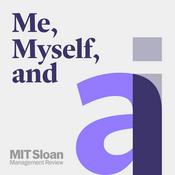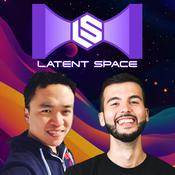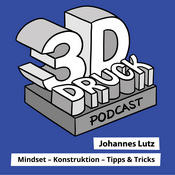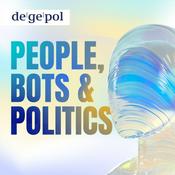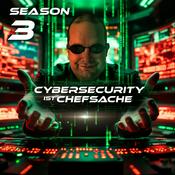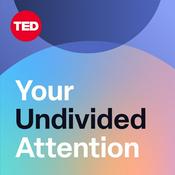60 Episoden

The 2026 Coding Roadmap That Gets Results (Forget Everything Else!)
08.1.2026 | 1 Std. 8 Min.
It’s 2026. If you want to learn how to code and actually get results, this episode is your roadmap.Danny and Leon break down the stuff that is not “cool advice,” but is the advice that gets people hired. We talk about why course-hoarding feels productive but is not, what the real bottleneck in tech actually is (hint: not syntax), and how to build a learning system that survives the trough of sorrow.You’ll walk away with:The 3-part foundation that decides if you stick with codingWhy “problem solving” is the real job, not typing codeWhen AI helps, and when it quietly ruins your learningThe learning science that separates dabblers from finishers (active recall + spaced repetition)How to pick what to learn based on your local market (and stop wasting years)Why community is the cheat code that keeps you moving when motivation diesIf your goal is to learn to code this year, do one action right now: join a community, pick a path, and start.✅ If you made it to the end, comment: “In 2026 I’m gonna grow my skill set.”SITE https://www.programmingpodcast.com/Stay in Touch:📧 Have questions for the show? Or are you a business that wants to talk business?Email us at [email protected]!Danny Thompsonhttps://x.com/DThompsonDev / dthompsondev www.DThompsonDev.comLeon Noelhttps://x.com/leonnoel / leonnoel https://100devs.org/📧 Have questions for the show? Or are you a business that wants to talk business?Email us at [email protected]!Chapters00:00 - The 2026 promise: real results, not cool advice01:56 - Why you should listen to us (and why this episode goes viral)04:18 - Start with your “why” or you will quit05:45 - The 3 foundations: manage frustration, consistency, take care of yourself09:11 - What companies pay for: problem solving, not syntax12:30 - The shiny becomes dull: how people quit when novelty fades15:49 - Build to derisk yourself: projects that help vs projects that hurt17:15 - The trough of sorrow and crash of ineptitude18:51 - AI as the easy exit, and why you cannot take it21:09 - Hot take: earn AI later, do not use it early22:46 - Over-reliance makes you weaker (and why teams sometimes remove AI)25:36 - Learn how to learn: Barbara Oakley and rebuilding your foundation26:45 - Active recall: do less work, remember more27:45 - Spaced repetition: stop forgetting what you learn30:11 - Build projects early to create incentive and momentum32:25 - Make concepts “sticky” with analogies and mental models33:31 - Your first year on the job decides career vs job35:37 - Stop asking for “the tech stack” and start reading your local market38:40 - Dallas example: 400 MERN jobs vs 34,000 Java jobs42:31 - No one is taking risks right now: prove you can hit the ground running44:16 - Target companies strategically (emerging talent programs, hiring volume)47:00 - Do not marry a stack, marry adaptability48:49 - System rules: make every project your own, break goals into daily actions51:38 - Pick one path and finish: FreeCodeCamp, Odin Project, 100Devs, Full Stack Open52:42 - The real cheat code: community56:31 - Motivation expires, community keeps you moving59:44 - Talent is distributed, opportunity is not1:03:28 - Take action right now: join a community1:04:34 - Comment to prove you are a real one1:04:56 - “I don’t have time” and the priority truth1:06:10 - Your value in 2026: caring, context, judgment, and composing solutions

Why Even Staff Engineers Feel Behind on AI Right Now! (You are not alone!)
30.12.2025 | 59 Min.
The “prompt-and-pray” era is over — and that’s a good thing.In this episode, we break down why AI “magic” collapses under real production traffic (edge cases, hallucinations, messy inputs, and even infrastructure-level failures)… and what replaces it: actual AI engineering.Danny frames the shift with four architectural pillars that make LLM features shippable and reliable:- State orchestration (stop treating models like employees — they’re stateless CPUs)- Constraint generation (JSON forcing, schema-driven outputs, type-safe sampling)- Infrastructure reliability (retries, backoff, fallbacks — because inference can and will fail)- Regression testing & evals (measure prompts like code, break builds when quality drops)SITE https://www.programmingpodcast.com/Stay in Touch:📧 Have questions for the show? Or are you a business that wants to talk business?Email us at [email protected]!Danny Thompsonhttps://x.com/DThompsonDev / dthompsondev www.DThompsonDev.comLeon Noelhttps://x.com/leonnoel / leonnoel https://100devs.org/📧 Have questions for the show? Or are you a business that wants to talk business?Email us at [email protected]!We also hit the reality of agent “throughput” vs human review bottlenecks (Phoenix Project vibes), why monolithic agents are a trap, and a listener question about networking + credibility after pitching an MVP that isn’t fully shipped yet.If you’re building AI features for real users — not demos — this is the blueprint.00:00 — The “prompt-and-pray” era is over02:49 — AI hype fades: guardrails + reality06:34 — Deterministic software vs probabilistic models07:29 — The 4 pillars of AI engineering (overview)11:37 — Pillar 1: state orchestration (FSM, stateless models)20:26 — Pillar 2: constraint generation (JSON, schemas, type safety)28:28 — Pillar 3: infra reliability (retries, fallbacks, failures)32:21 — Pillar 4: evals + regression testing (LLM-as-judge)43:40 — Listener question: networking, MVP pressure, and credibility

Production Error EXPOSED: Internal Variables Leaked Public (Software Developers React)
19.12.2025 | 42 Min.
We caught a massive production error during the new Steam Machine launch that exposed internal database IDs and undefined variables to the public. In this episode, we break down exactly what went wrong, how a simple try/catch or React Error Boundary could have saved them, and why "testing in production" is terrifying when millions of dollars are on the line.Plus, we answer a listener's question about getting stuck on "perfecting" projects. Danny explains why building a "Discord Clone" might actually be hurting your resume and why you need to stop obsessing over your navbar and just SHIP.SITE https://www.programmingpodcast.com/💡 Sponsor: Level Up Financial PlanningChanging careers or increasing your income? Get financial clarity with Level Up Financial Planning—helping early and mid-career tech professionals secure their financial future. Visit LevelUpFinancialPlanning.com for a free consultation!https://www.levelupfinancialplanning.com/Stay in Touch:📧 Have questions for the show? Or are you a business that wants to talk business?Email us at [email protected]!Danny Thompsonhttps://x.com/DThompsonDevhttps://www.linkedin.com/in/DThompsonDevwww.DThompsonDev.comLeon Noelhttps://x.com/leonnoelhttps://www.linkedin.com/in/leonnoel/https://100devs.org/📧 Have questions for the show? Or are you a business that wants to talk business?Email us at [email protected]!In this episode:The Steam Machine Incident: How a launch page leaked internal naming conventions.Frontend Defense: Using Zod, Optional Chaining, and Error Boundaries to fail gracefully.The "Clone" Trap: Why recruiters don't care about your Discord clone (and what to build instead).The 95% Rule: How to stop letting small features kill big projects.Chapters: 0:00 - The Steam Machine Production Error 03:15 - Leaking Database IDs & Console Logs 06:28 - The Fix: React Error Boundaries & Fallback UIs 10:50 - Frontend Defense: Optional Chaining, Zod & Defaults 13:06 - Sponsor: Level Up Financial Planning 15:32 - The Power of Try/Catch & Environment Variables 18:57 - Root Cause Analysis: How did this hit Prod? 26:19 - HackerOne & Getting Paid for Bugs 29:50 - Q&A: "I can't finish my projects" (The Navbar Trap) 37:36 - Why "Clone Projects" Are Hurting Your Resume 41:00 - Conclusion: Let it die on a small feature

We Need To Talk About The React Hack... (I’ve Never Seen A Vulnerability This Bad.)
11.12.2025 | 59 Min.
🚨 Severity 10/10: The React Exploit That Shocked the Web Dev WorldImagine waking up to find your server blocked for mining crypto for a stranger.That’s exactly what happened to developers this week, thanks to a critical vulnerability in React and Next.js that enabled full root-level server takeover.In this episode of The Programming Podcast, we break down the “Perfect Hack” step-by-step, how Vercel burned $750,000 in a single weekend to contain it, and the one line in your Dockerfile that might be leaving your environment exposed.Then we shift gears into a tough career conversation:Are you a “Tourist Developer”, constantly learning, never shipping?If you’ve got 50 tabs open and 0 deployed code… the second half of this episode is for you.SITE https://www.programmingpodcast.com/💡 Sponsor: Level Up Financial PlanningChanging careers or increasing your income? Get financial clarity with Level Up Financial Planning—helping early and mid-career tech professionals secure their financial future. Visit LevelUpFinancialPlanning.com for a free consultation!https://www.levelupfinancialplanning.com/Stay in Touch:📧 Have ideas or questions for the show? Or are you a business that wants to talk business?Email us at [email protected]!Danny Thompsonhttps://x.com/DThompsonDevhttps://www.linkedin.com/in/DThompsonDevwww.DThompsonDev.comLeon Noelhttps://x.com/leonnoelhttps://www.linkedin.com/in/leonnoel/https://100devs.org/📧 Have ideas or questions for the show? Or are you a business that wants to talk business?Email us at [email protected]!What We Cover- The “React to Shell” exploit (Non-technical AND technical explanations)- Why running Docker as root is a catastrophic security mistake- How Cloudflare accidentally broke part of the internet trying to patch this- The Parking Lot Method to finally stop getting derailed by side quests- How to identify if you’re stuck in Tourist Developer Mode⏱️ CHAPTERS0:00 – The Nightmare: Server hijacked for crypto mining2:29 – CRITICAL WARNING: Update React Now3:55 – Anatomy of the Attack (361% CPU Spikes)6:50 – The Fatal Mistake: Docker as Root12:43 – The “Restaurant” Analogy (Explaining the Hack)17:08 – Sponsored Segment18:20 – Technical Deep Dive: Flight Protocol & Serialization20:59 – The One Line of Code That Fixes It23:44 – Vercel’s $750,000 Weekend Response40:17 – How Cloudflare Accidentally Broke the Internet42:33 – Career Q&A: “I keep getting distracted by side quests”48:36 – Are You a Tourist in Your Own Career?51:08 – The Parking Lot Method for Focus54:27 – The Index Card System for Goals🔗 ResourcesGuillermo Rauch’s Full Breakdown – https://x.com/rauchg/status/1997362942929440937Eduardo’s Original Report – https://x.com/duborges/status/1997293892090183772🔔 45% of you aren’t subscribed.If you like content that makes our moms proud, hit that subscribe button.

The Job Search Crisis: Why 3.3 Million People Are Failing (And How To Fix It)
04.12.2025 | 1 Std. 1 Min.
“I f*cking give up. May these companies rot.”That one Reddit post cracked open the real state of the 2025 tech job market. Why are Master’s degree grads and senior engineers going months without a single offer, while others are quietly doubling their income with one strategic question?SITE https://www.programmingpodcast.com/💡 Sponsor: Level Up Financial PlanningChanging careers or increasing your income? Get financial clarity with Level Up Financial Planning—helping early and mid-career tech professionals secure their financial future. Visit LevelUpFinancialPlanning.com for a free consultation!https://www.levelupfinancialplanning.com/Stay in Touch:📧 Have ideas or questions for the show? Or are you a business that wants to talk business?Email us at [email protected]!Danny Thompsonhttps://x.com/DThompsonDevhttps://www.linkedin.com/in/DThompsonDevwww.DThompsonDev.comLeon Noelhttps://x.com/leonnoelhttps://www.linkedin.com/in/leonnoel/https://100devs.org/📧 Have ideas or questions for the show? Or are you a business that wants to talk business?Email us at [email protected]!In this episode, Leon and I break down why applying to big tech has turned into The Hunger Games, the hidden way internal hiring blocks you before you even start, and the psychological “Pattern Disrupt” technique that makes recruiters remember you instantly — even in a market that’s drowning in resumes.Your code gets you into the room.Your communication keeps you in the seat.If you want to survive this market, silence is no longer an option.TIMESTAMPS0:00 – The Crisis: “May These Companies Rot”1:26 – The Reddit Post That Broke The Internet6:50 – The “Trough of Sorrow” & The 1-in-60 Rule11:55 – The Google Trap (3.3M Applicants for 5k Jobs)16:42 – The Truth About Internal Hiring & “Soft No’s”22:00 – The “Pattern Disrupt”: How To Hack The Interview30:00 – The Pickleball Strategy (Networking Without Being Cringe)41:30 – Rejection Therapy: Training Your Brain at Starbucks49:00 – “Pre-Season” Prep: Why You Are Failing Technical Rounds55:00 – Case Study: How She Doubled Her Income Overnight58:34 – “You Are Not Saint Jude” (Stop Donating Your Skills)
Weitere Technologie Podcasts
Trending Technologie Podcasts
Über The Programming Podcast
Höre The Programming Podcast, Acquired und viele andere Podcasts aus aller Welt mit der radio.de-App
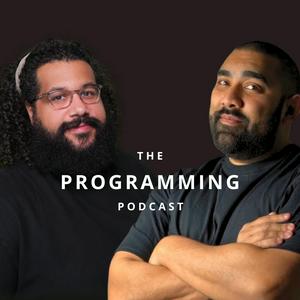
Hol dir die kostenlose radio.de App
- Sender und Podcasts favorisieren
- Streamen via Wifi oder Bluetooth
- Unterstützt Carplay & Android Auto
- viele weitere App Funktionen
Hol dir die kostenlose radio.de App
- Sender und Podcasts favorisieren
- Streamen via Wifi oder Bluetooth
- Unterstützt Carplay & Android Auto
- viele weitere App Funktionen


The Programming Podcast
App laden,
loshören.













